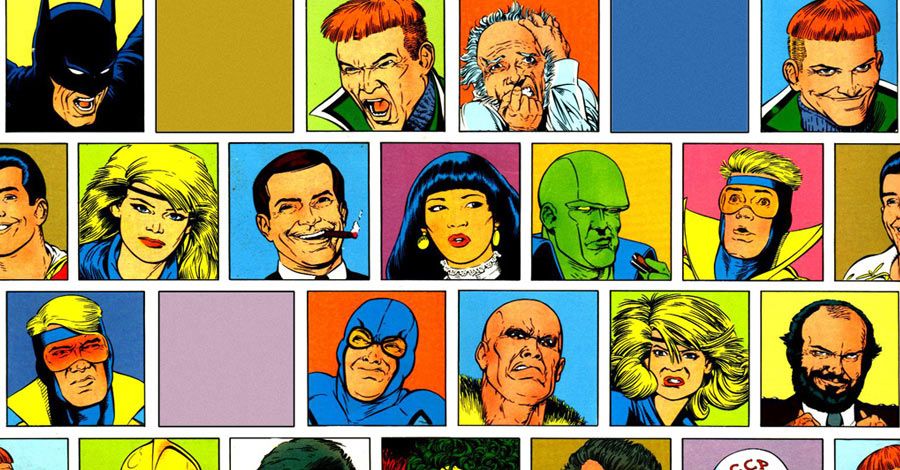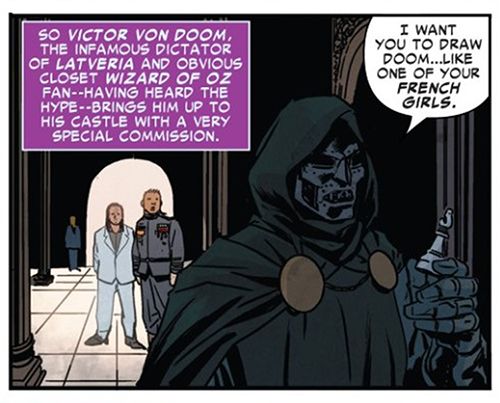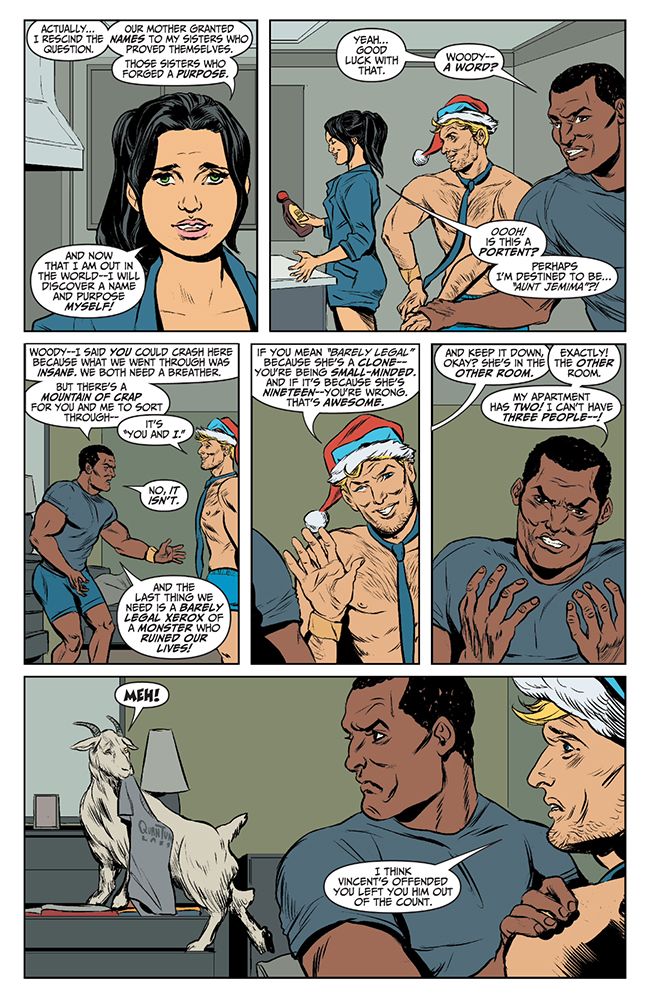With a regular column, I know that some weeks I have to be more curmudgeonly than others. I can't be a crusader every week, and I can't be celebratory about everything; some weeks I have to go full-on Andy Rooney because, you know, I just don't understand something and I want to know if you ever noticed a thing. Also, people still know who Andy Rooney is, right? If you want to read this piece in the voice of your grumpy uncle that gets just a little madder than everyone else at Thanksgiving, go right on ahead.
A few weeks ago, Image held their Image Expo and revealed a ton of new comics. Fans got excited, I got excited, and the comic book industry got excited. The books are diverse in tone, intent, and artistic style, furthering the correct assertion that comics are more than just superheroes. But when looking at the rundown, I had just one question: where are the comedy books?
See, I'm a comedy guy. That's not news, as I've rambled about that in the past, and I have shamelessly worked plugs into these articles way too often. Aside from making comedy regularly in the form of a sketch podcast and improv, my entire non-comic book existence is pretty much defined by comedy. I found my entire real life social network at a comedy theater, and "do comedy" is pretty much the main moneymaking plan most of my friends practice -- and it's actually started working out for a lot them. I live comedy, my friends live comedy, and it wasn't until the Image Expo that I realized that mainstream comics... don't.
That's not to say that Image's new offerings aren't diverse. There are superhero comics ("C.O.W.L."), women in prison comics ("Bitch Planet"), noir comics (the universe of Ed Brubaker and Sean Phillips), horror comics ("Wytches"), urban fantasy comics ("The Wicked and the Divine"), and, well, Matt Fraction comics ("Casanova," "Ody-C"). The new Image lineup offers such a wide diversity that to me, Mr. Comedy Brain, the lack of comics focused on one of the most popular genres in all of fiction just jumps out at me.
Comedies are all over network television again, making a comeback after a few years of being crowded out by reality shows and "Lost" rip-offs. There are freshman critical hits like "Brooklyn Nine-Nine" and freshman ratings hits like "The Goldbergs." Powerhouses like "New Girl" and "Bob's Burgers" are hitting their stride and locking in for long runs. Veteran show "Parks and Recreation" just secured another -- possibly final -- season, just as fellow veteran "How I Met Your Mother" gears up for its finale. "Key & Peele" is proving that televised sketch comedy is still a force to be reckoned with, while "Saturday Night Live" undergoes its latest transformation. "Community" even defied odds to come back for a fifth season, proving that it has a fanbase as supportive as any fantastical drama out there.
How many comedy comics are being published at the big comic book publishers right now? And I don't mean action comics that just contain funny parts, I mean comics that are written as comedies, first and foremost? I really hope I'm missing something, but I think "Quantum and Woody" and "Superior Foes of Spider-Man," and sometimes "Deadpool," are about it.
The recently ended "Young Avengers" and the still kicking "Hawkeye" definitely contained/contain exchanges that made/make me laugh out, but they're not comedies. When comics from the big publishers do comedy, they still put the superhero/sci-fi/action/adventure genre up front, and then have characters react to those situations in humorous ways. Don't get me wrong, because I love comics like that. I just wonder why there aren't many comics at the big publishers that are joke machines in the way that "30 Rock" and "Arrested Development" were.
I get that writing a straight-up comedy has to be one of the most terrifying prospects for a comic book writer. With superhero comics, a writer can defend plot holes and argue logic and explain away inconsistencies. There's a defense in place. With comedy, something's either funny to a reader or it's not. I've never laughed hard at a joke after it was explained to me. Writing comedy comics is a bit like going without a net; you either fly through the air or you fall to the ground. You can't argue with gravity, and you can't argue with your audience's taste in humor.
But from hanging out with creators at conventions and listening to them on podcasts, I know that comic book people are hilarious. I know they love comedy. I also know, from trying to make it in both fields, that the communal aspects and the career trajectories are incredibly similar; there's a lot of commiseration to be had between comics and comic creators. That might be why a lot of them take the "Buffy the Vampire Slayer" approach to injecting comedy into their comics. "Buffy" was, at times, the funniest show on television during its run -- but it was a supernatural action show first and foremost. People that came to "Buffy" for the jokes were the exact type of people that would get pretty much every one-liner committed to script; the people that came to "Buffy" for the horror-y action-y stuff got a satisfying amount of that genre, so they didn't care about the jokes. I think this is how comedy works in comics, too.
Comedy's also an incredibly aural medium, which contributes to the difficulty writers face when crafting jokes for comics. A joke might not read funny on the page, but it can destroy in the hands of the right performer. The best "Saturday Night Live" performers demonstrate this weekly. Aidy Bryant, Kate McKinnon, or Bobby Moynihan could read an Applebee's menu out loud and bring previously unfathomable levels of laughter out of your gut. Comedy in comic books has to rely almost totally on the printed words, while the artist has to dish out facial expressions that sell jokes. I can see where it would be difficult.
The thing is, though, that joke-heavy and joke-dominant comics work, even if they aren't tried all that often. Peter David and Larry Stroman's initial "X-Factor" run in 1991 packs satire, puns, quips, wit, and sitcom qualities onto every page. Kevin Maguire's nuanced artwork gave J.M. DeMatteis and Keith Giffen seemingly real actors to write jokes for in "Justice League International." Joe Kelly's first year of "Deadpool" stories contain some of the most absurd, Adam McKay/Will Ferrell-level gags I've ever seen on a printed page. Those three runs are examples of how comedy comics can work in the superhero genre, but they're also examples of why they don't always work. Peter David left "X-Factor" because, as a satirical comedy book in a superhero line, it had to keep crossing over for big events. "JLI" is still regarded as just a cult favorite. Joe Kelly's "Deadpool" was never a big seller, and he eventually left the book over the constant threats of cancellation. Comedy books have a hard time selling at mainstream publishers.
That hasn't stopped a few from appearing every couple years. Marvel smartly hired professional comedians Gerry Duggan and Brian Posehn to spearhead "Deadpool's" relaunch, and it really worked. The first arc, wherein Deadpool had to re-kill the reanimated American Presidents, was one of the funniest comics I've read in years. "Superior Foes of Spider-Man" by Nick Spencer and Steve Lieber continually hits the heights of depraved lunacy previously only seen in the sitcom "It's Always Sunny in Philadelphia." You wouldn't know it by the book's title, but "Superior Foes" is hilarious. Dark Horse Comics even published one of the funniest books I've ever read: "Buddy Cops" by Nate Cosby and Evan Shaner. I'm pretty confident that "Buddy Cops" would have been picked up by Comedy Central were it initially conceived of as a web series, it's that funny. Instead, a one-shot issue is all we have right now.
I have to devote a little bit of my word count to "Quantum and Woody." James Asmus, who has a deep comedy background, is proving that comics can be relentless joke machines, on par with "30 Rock." Asmus and letterer Dave Lanphear have somehow figured out a way to control how I read each character's dialogue, ensuring that I'm taking in the dialogue at the exact right pace and optimizing the book's comedic timing. Any doubt I have about comedy working in long-form comics gets squashed every month when I read "Quantum and Woody."
I know comedy can work in comic book form. The entire webcomic medium is built on this notion, and they're following in the long, long tradition of newspaper comic strips. It just surprises me that 20-plus page installments of monthly comedy comics aren't more of a presence in the industry; from the look of the comic book landscape right now, it looks like readers aren't all that interested in reading them, the big name writers aren't interested in writing them, and the publishers don't have to make them a priority. Comedy forms a big percentage of the movies, television, and web content we consume, but comedy comics are mysteriously absent from my pull list every week.
This concludes the most curmudgeonly and possibly out of touch article I've written in a while. If I've overlooked some hilarious books coming out monthly from a publisher, I desperately want to know about it. Prove me wrong, comic book community.
Brett White is a comedian living in New York City. He co-hosts the podcast Matt & Brett Love Comics and is a writer for the comedy podcast Left Handed Radio. His opinions can be consumed in bite-sized morsels on Twitter (@brettwhite).



